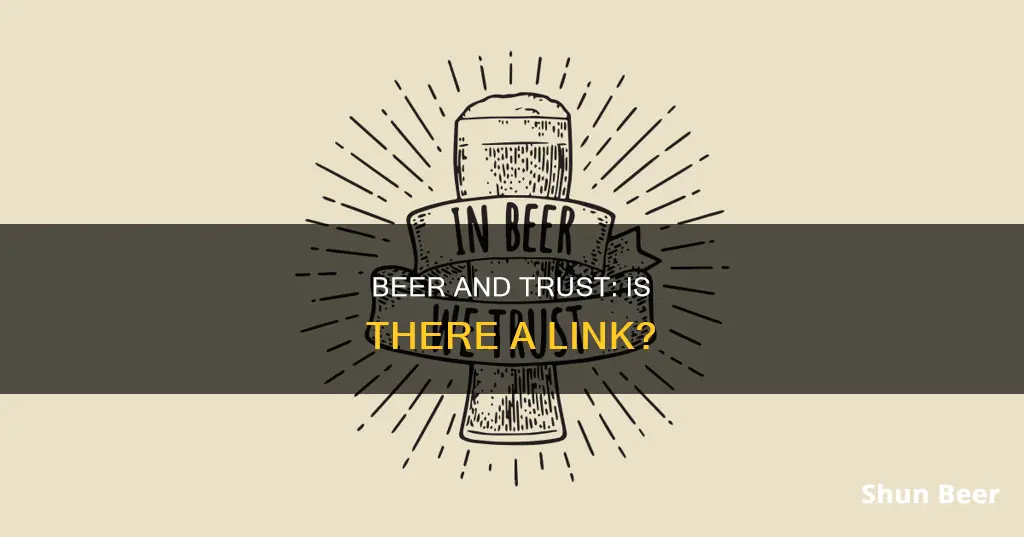
Drinking alcohol is a common social activity, and it is often associated with trust and social bonding. However, the relationship between alcohol consumption and trust is complex and multifaceted. While some people believe that drinking beer or other alcoholic beverages fosters trust and facilitates social interactions, others argue that abstaining from alcohol can be a sign of discipline, independence, and self-control.
In certain cultures and social circles, there is a perception that individuals who choose not to drink may be untrustworthy or have something to hide. This belief has been reflected in sayings such as never trust a man who doesn't drink. However, this idea has been challenged, and there is no conclusive evidence to support a direct link between alcohol consumption and trustworthiness.
Additionally, it is important to consider the potential risks associated with alcohol consumption, such as addiction, health issues, and impaired judgment. For individuals in recovery from alcoholism or with a family history of addiction, even small amounts of alcohol can be triggering. As a result, the decision to drink or abstain from alcohol is a personal one, influenced by various factors, including cultural norms, personal values, and health considerations.
What You'll Learn

Drinking beer and trustworthiness
The Social Aspect of Drinking Beer
Drinking beer is often associated with social interactions and networking. In Denmark, for example, alcohol plays a significant role in socialising, and membership in organisations and clubs is positively correlated with alcohol consumption. This suggests that drinking beer can facilitate social connections and strengthen trust among individuals.
The Relationship Between Beer and Trustworthiness
The relationship between drinking beer and trustworthiness is nuanced and varies across different indicators. On the one hand, some people believe that abstaining from drinking can indicate a lack of trustworthiness. This sentiment is reflected in the old saying, "never trust a man that doesn't drink." However, this notion has been challenged, with some arguing that it is a person's drinking behaviour, rather than their abstinence, that should be a cause for concern.
Additionally, certain cultural and religious factors can influence the perception of trustworthiness among drinkers and non-drinkers. For instance, in business meetings in certain cultures, drinking alcohol is considered an important aspect of building trust and rapport.
Health Implications and Recovery Considerations
It is important to consider the potential health implications of drinking beer. Excessive alcohol consumption can lead to risky behaviours and health issues. However, moderate drinking can have positive effects, as evidenced by studies showing that moderate drinkers live longer than teetotallers.
For individuals in recovery from alcoholism, the topic of drinking beer and trustworthiness is particularly sensitive. Non-alcoholic beers, which often still contain trace amounts of alcohol, can be triggering for people in recovery. While some view these beverages as a way to socialise without fully abstaining, others prefer to avoid them entirely to maintain their sobriety.
Final Thoughts
The relationship between drinking beer and trustworthiness is multifaceted and subject to individual interpretations. While some associate beer drinking with socialisation and trust, others view it with suspicion or as an indication of negative traits. Ultimately, the decision to drink or abstain is a personal choice, and an individual's level of trustworthiness should not be solely based on their drinking habits.
Beer Drinking: Hand Pain and Daily Habits
You may want to see also

Non-drinkers and hidden agendas
Non-drinkers are often unfairly judged and stigmatised, with some assuming they have a hidden agenda or negative traits. This is simply not true, and there are many reasons why someone might choose not to drink alcohol.
Firstly, it is important to acknowledge the problematic nature of the assumption that non-drinkers are untrustworthy. This is a harmful stereotype that can lead to discrimination and exclusion. It is also worth noting that, in some cases, non-drinkers may have valid reasons for not consuming alcohol, such as a history of addiction or health issues.
There are a variety of reasons why someone might choose not to drink alcohol. Some people may have religious or cultural beliefs that discourage alcohol consumption. Others may have had negative experiences with alcohol in the past, either personally or through witnessing the impact on loved ones. Additionally, some individuals may choose not to drink due to the potential impact on their health, finances, or personal goals. For example, athletes or individuals with certain medical conditions may choose to abstain from alcohol.
It is also important to recognise that some non-drinkers may be in recovery from alcohol use disorder or may be at risk of developing an unhealthy relationship with alcohol. In these cases, abstaining from alcohol is a positive and healthy choice.
Furthermore, the assumption that non-drinkers are untrustworthy can create a sense of pressure to consume alcohol to fit in or be accepted. This can be particularly challenging for young people or those in social or professional situations where drinking is common.
While some non-drinkers may choose to consume non-alcoholic beverages that resemble alcohol, such as non-alcoholic beer, this does not necessarily indicate a hidden desire to drink. Instead, it may be a way to participate in social activities without consuming alcohol.
In conclusion, the assumption that non-drinkers are untrustworthy or have hidden agendas is unfounded and unfair. Individuals may choose not to drink alcohol for a variety of valid reasons, and their choice should be respected.
Beer and Trazodone: Safe Mix or Health Risk?
You may want to see also

Alcohol and social capital
Alcohol consumption has been linked to social capital, with several studies finding a correlation between the two. However, the nature of this relationship is complex and depends on various factors, including the specific dimensions of social capital and alcohol consumption being studied.
Social capital refers to social organisation features such as trust, norms, and networks that facilitate coordinated actions and improve societal efficiency. It includes components like social networks, social norms, social support, and trust. These indicators of social capital have been found to be related to individual health and can influence health behaviours such as alcohol consumption.
One study found that social networking with male friends, membership in voluntary organisations, and generalised trust were positively associated with the volume of alcohol consumption and heavy drinking. This suggests that alcohol consumption may play a role in socialisation and that drinking is a common part of social interactions for some individuals. Additionally, individuals with strong social networks are less likely to engage in risky health behaviours and are more likely to be monitored and controlled by their network, which can exert social control over drinking behaviour.
On the other hand, individuals with low levels of trust may be more likely to engage in risky health behaviours, as they may be sceptical of health-related advice from others. Social support has also been found to have a buffering effect against heavy episodic drinking, as adequate support can help reduce stressful actions and encourage healthy behaviours.
It is important to note that the relationship between alcohol consumption and social capital is not always consistent and can vary across different indicators and contexts. For example, some studies have found no evidence that social capital is related to binge drinking, while others have found that low levels of generalised trust are associated with high alcohol consumption.
Furthermore, the direction of the relationship between social capital and alcohol consumption is not always clear. While some studies suggest that high social capital may protect against risky health behaviours like alcohol consumption, others find that certain aspects of social capital, such as social networking and generalised trust, are positively associated with drinking. This highlights the complexity of the relationship and the need for further research to understand the causal mechanisms underlying these associations.
Cholesterol and Beer: How Much is Too Much?
You may want to see also

Beer and recovery
Proponents of beer as a recovery drink argue that beer provides carbohydrates and electrolytes, which can be depleted during long or intense exercise. In addition, the social aspect of drinking beer with friends after a grueling workout or race can be a great way to encourage regular exercise and build camaraderie. A study from 2015 published in the Journal of the International Society of Sports Nutrition found that a moderate beer intake had no negative effects on hydration in active individuals. This has led some to believe that a couple of beers, especially those with low alcohol content, are acceptable for post-workout recovery.
On the other hand, experts in sports medicine and dietetics argue that alcohol negatively affects the body's ability to absorb glycogen from carbohydrates and synthesize protein in the muscles, which is crucial for muscle healing and growth. Alcohol is also dehydrating, which counteracts the goal of proper post-workout recovery. A study published in February 2014 in a medical research journal concluded that when an alcohol and protein or alcohol and carbohydrate mixture was ingested after a workout, muscle growth was impaired compared to ingesting protein or carbohydrates alone.
So, what is the verdict on beer and recovery? While having an occasional beer after a workout may not be detrimental, it is also not beneficial. If you choose to drink beer after exercising, it is important to prioritize hydration by drinking water and consuming a healthy amount of protein and carbohydrates before and after drinking alcohol. Beers with higher alcohol content will have a more negative impact on recovery, so it is best to opt for lower-alcohol options.
In conclusion, while beer may not be the ideal recovery drink, it can be enjoyed in moderation as part of an active lifestyle. However, it is important to understand that beer does not provide the same benefits as traditional recovery drinks and may even hinder the recovery process. As always, it is crucial to listen to your body and maintain a healthy balance between exercise and relaxation.
Anesthesia and Alcohol: Safe to Drink Beer Post-Procedure?
You may want to see also

Alcohol-free beer
One of the leading alcohol-free beer brands is Athletic Brewing Company, which offers a range of non-alcoholic craft beers, such as their Run Wild IPA and Lite beer. Another well-known brand is Partake, which has a delicious blonde ale with only 15 calories and 3 carbs, making it a satisfying adult choice. Heineken has also entered the non-alcoholic market with Heineken 0.0, which has the characteristic skunkiness and mouthfeel of its classic beer.
For those who enjoy a good IPA, there are several options available. The Lagunitas Brewing Company offers an IPNA with notes of pine and citrus, while the Hedlum Brewing Company has a Juicy Boom IPA with tropical and citrusy hop aromas. If you're looking for a hazy IPA, BrewDog's Hazy AF is a great choice, with bold flavours of lemon and grapefruit.
In addition to IPAs, there are several other styles of alcohol-free beer to explore. For example, the Bravus Brewing Company offers a non-alcoholic West Coast IPA and a Raspberry Gose, which has tasting notes of blood orange, sea salt, and raspberries. If you're a fan of stouts, Bravus also has an Oatmeal Dark Stout with rich chocolate, coffee, and caramel notes. For those who prefer lighter beers, the Weihenstephaner Hefeweissbier is a refreshing non-alcoholic wheat beer with a touch of hops.
So, whether you're looking for a hoppy IPA, a crisp lager, or a rich stout, there are plenty of alcohol-free options to choose from that can satisfy your taste buds without the alcohol.
Melatonin and Beer: Is It Safe to Mix?
You may want to see also
Frequently asked questions
Drinking beer does not necessarily mean trust. However, some people may associate drinking beer with positive social interactions and generalised trust. On the other hand, some people may not trust those who don't drink beer, assuming that they have a hidden agenda or negative traits. Ultimately, trust is a complex concept that cannot be reduced to whether or not someone drinks beer.
Drinking beer often plays a role in social interactions and can be a part of socialisation. Beer is often consumed in social settings, such as with friends or colleagues, and can facilitate bonding and the development of trust. However, excessive drinking or heavy episodic drinking can lead to social isolation and the loss of friends.
Drinking beer, especially in excessive amounts, can have negative health consequences. Heavy episodic drinking, or binge drinking, is defined as consuming five or more units of alcohol on one occasion. This can lead to risky health behaviours and health damage. Additionally, drinking beer can be associated with social isolation and stress, which can further impact an individual's health.







